At least I don’t. I think it’s because I know them so well, pray them so often, that I usually just rattle them off, trying to get on to the “important” things that follow. Or sometimes I use them to settle my mind and heart before I really get down to praying. No matter, I pay little attention to the prayers themselves – including early this morning.
“And Jesus said ‘When you pray, do not keep babbling like pagans, for they think they will be heard because of their many words.'” Matthew 6:7 Is that me? Yes. And I guess I’m writing this Post so that if I tell you what to do, then maybe I’ll feel obligated to do what I say!
Now granted, Orthodox worship and prayer has so very many words that we can’t focus on every one of them every time. We shouldn’t feel guilty about that. And truth is some days I find it very difficult to concentrate. However, at least I could try.
Oh, I haven’t yet told you what prayers we’re talking about.
The Trisagion Prayers
All videos from “Orthodox Christian Chants”. This is the most gorgeous collection of Orthodox music I know. Go to: https://www.youtube.com/channel/UC2eQY65jlYsdDuevEUE9CGQ/videos On the top left punch “Videos”.
It’s such a shame to hurry past these beautiful prayers. They have great depth. In many ways they set the pattern for a balanced Orthodox prayer life. So let’s take a close look at them
As I said, we use them often: They introduce Matins (Orthros) and are said again towards the end. Likewise at Little Compline, and at Great Compline where they appear three times (indicating that this is an amalgam of what were originally three services), and at Holy Unction. At Vespers the Trisagion Prayers come late in the service, just before the Troparia/Apolytikia which announce the theme of the coming day. Most forms of our personal prayers * begin with these prayers.
- I say “personal” instead of “private” because, though we usually say these when we’re alone, there is no “private” prayer. We always pray as part of the community, always “Our Father who art in heaven”, never “my Father”.
Trinitarian
Did I tell you this before? Once a visitor to Saint Nicholas asked me if the Orthodox Church is “Christ-centered”. I pondered for a moment, then answered “Yes. We are a Trinity-centered Church”. Many denominations appear to emphasize either the Father (creation) or the Son (salvation) or the Holy Spirit (renewal) – though these distinctions are artificial, since all three Persons of the Trinity create, save and renew us. Near us in Cedarburg are many Lutheran parishes and schools with big signs in front: “Christ Alone”. 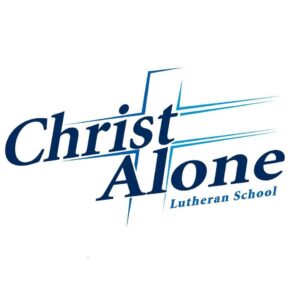 I doubt they’ve actually given up the Father and the Spirit! but really, dear Lutheran friends, doesn’t this sound a bit unbalanced?
I doubt they’ve actually given up the Father and the Spirit! but really, dear Lutheran friends, doesn’t this sound a bit unbalanced?
This is a school first town south of us.
Many Christians often conclude their prayers simply “Through Jesus Christ our Lord. Amen”. But almost all Orthodox prayers conclude with some form of ascription to the Holy Trinity: “for unto Thee are due all glory, honor and worship: to the Father and to the Son and to the Holy Spirit, now and ever and unto ages of ages. Amen.”
Orthodox Festival Matins begins “Glory to the Holy, Consubstantial, Life-giving and Undivided Trinity, always, now and ever, and unto ages of ages.” * That always sends a holy thrill up my spine. Our Divine Liturgy begins “Blessed is the Kingdom of the Father and of the Son and of the Holy Spirit, now and ever and unto ages of ages.” *
- I printed these in full because, well, um… because so few Orthodox ever hear how our services begin.
OK, are you convinced? The Orthodox Church is Trinitarian par excellence.
The Prayers
By their very title, these “Trisagion” (“Thrice Holy”) Prayers are Trinitarian, all of them save the last. Let’s consider them.
Holy God, Holy Mighty, Holy Immortal: have mercy on us. (thrice)
In the Orthodox Church anything we say thrice like this has a Trinitarian implication. So here we get the Holy Trinity repeated thrice!
It is sometimes said that “Holy God” refers to the Father, “Holy Mighty” to the Son, “Holy Immortal” to the Holy Spirit, though there’s nothing in the words themselves to suggest that.
“Holy” is beyond definition. It must be experienced. In his book The Idea of the Holy, Lutheran theologian Rudolf Otto wrote that the experience of “the holy” is so pure, so beautiful that it attracts us, yet so awesome, so powerful that it drives us away. I wrote a while back that I think this is why, when I was on Mount Athos, I was much drawn into life there, especially the gorgeous worship, and at the same time I could hardly wait to get away. There is nothing of this “Howdy, God” stuff here.
“God” Himself is beyond definition. We can know Him, but if you think you’ve got Him defined, that’s not God.
Our “mighty” God has all power within Himself. All we are and do is because of His power, shared with us.
God is “immortal”, eternal. He exists * beyond our world in His eternal “Now”. If we are to be immortal, it is only by His gift.
- Even the word “exists” is inadequate to describe Him, for He creates “existence”.
“Have mercy” is an inadequate translation of Greek “eleison”, ελέησον. In English it suggests “spare us”, as if God’s purpose is to punish or kill us. No. “Eleison” derives from the old Greek word for “oil”, έλεος – oil with all it’s healing qualities. That’s why the Church anoints us with oil for healing. When Emperors and the like would come into town in trumph, people would cry “Kyrie eleison” – Lord *, pour out good and healthy things upon us.
- which does not mean divinity. English nobility (some of whom are far from “divine”!) are still addressed “My Lord”.
So the Trisagion means “Holy God, Holy Mighty, Holy Immortal, be gracious to us”. As you pray, think of it that way. I wish it were not translated into English at all, that we prayed “In peace, let us pray to the Lord.” “Kyrie eleison.”
Where did the Trisagion come from? Legend has it that during the reign of the Emperor Theodosios in the Fifth Century, Constantinople was suffering from dreadful earthquakes. People were in the Aghia Sophia church (the old one) praying for deliverance. A boy in a vision was lifted up into Heaven and heard the angels singing “Holy God, Holy Mighty…” and came back singing it, and we have been singing it ever since.
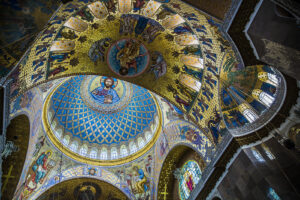
by Evangelidis at Wikimedia Commons
Glory to the Father, and to the Son, and to the Holy Spirit; now and ever, and unto ages of ages. Amen.
This Doxology is used, in one form or another, by all Christians. Its origin is in Christ’s command to the Apostles: “…baptize them in the name of the Father and of the Son and of the Holy Spirit”. Matthew 28:13
“Glory”, δόξα “Doxa” – another word beyond definition. In earlier times, when there were real kings and emperors, people could catch a hint of glory from their dignity, honor, praise and wonder. (British royalty still retain a bit of it on special occasions.) God possesses glory beyond imagining. To me the Scriptural passage which best conveys a sense of the glory of the Father and of His Son is in the vision of the prophet Daniel. Try to place yourself here with Daniel:
“I watched till thrones were put in place, and the Ancient of Days was seated; His garment white as snow, the hair of His head like pure wool. His throne a fiery flame, its wheels a burning fire; a fiery stream issued and came forth from before Him. A thousand thousands ministered to Him; Ten thousand times ten thousand stood before Him. The court was seated, And the books were opened… “I was watching in the night visions, and behold, One like the Son of Man, coming with the clouds of heaven! He came to the Ancient of Days, and they brought Him near before Him. Then to Him was given dominion and glory and a kingdom, that all peoples, nations, and languages should serve Him – His dominion an everlasting dominion, which shall not pass away, and His kingdom the one Which shall not be destroyed.” Daniel 7:9ff
Do you recognize these words? We say them in the Creed: “whose Kingdom shall have no end”.
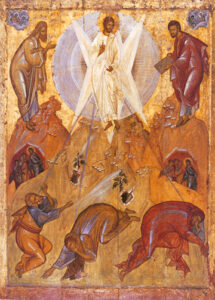 Can we mortals see God’s Glory? Insofar as we are able, yes. Three disciples did see it – though it was too much for them yet to handle. Read the accounts of Christ’s Transfiguration: Matthew 17:1–8, Mark 9:2–8, Luke 9:28–36. Someday by His grace we may all see the Glory of God face to face. Till then: “God who commanded light to shine out of darkness has shone in our hearts to give the light of the knowledge of the Glory of God in the face of Jesus Christ.” 2 Corinthians 4
Can we mortals see God’s Glory? Insofar as we are able, yes. Three disciples did see it – though it was too much for them yet to handle. Read the accounts of Christ’s Transfiguration: Matthew 17:1–8, Mark 9:2–8, Luke 9:28–36. Someday by His grace we may all see the Glory of God face to face. Till then: “God who commanded light to shine out of darkness has shone in our hearts to give the light of the knowledge of the Glory of God in the face of Jesus Christ.” 2 Corinthians 4
icons by permission of Saint Isaac’s Skete at skete.com
“Unto ages of ages” comes from the Greek word αιών, “aeon”. It could also be translated “unto aeons of aeons”. I like that.
All-holy Trinity, have mercy on us. Lord, cleanse us from our sins. Master, pardon our iniquities. Holy God, visit and heal our infirmities for Thy Name’s sake.
Another prayer addressed to the Trinity. Now we have petitions begging forgiveness, three of them, of course. Remember that the word “sin” (amartia, αμαρτία) in New Testament Greek means simply being “off the mark”. “Iniquity” means unrighteouness, evildoing. “Infirmity” means weakness, illness.
Lord, have mercy. (thrice)
Glory to the Father, and to the Son, and to the Holy Spirit; now and ever, and unto ages of ages. Amen.
And now a prayer that is not Trinitarian, the only prayer our Lord gave us:
Our Father, Who art in Heaven, hallowed be Thy Name. Thy kingdom come; Thy will be done on earth as it is in Heaven. Give us this day our daily bread; and forgive us our trespasses, as we forgive those who trespass against us, and lead us not into temptation, but deliver us from evil (or the evil one).”
There is more in the “Our Father” than we have room to discuss here, so just two things:
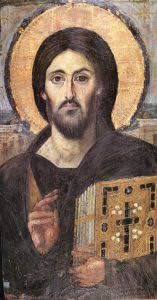 1 Please, for the sake of your soul, do not just rattle unthinkingly through “Forgive us our sins as we forgive those who sin against us.” “Father, if I don’t forgive, please don’t forgive me. If I pay people back, pay me back. If I hold a grudge, hold a grudge against me.” Don’t needlessly panic here. Remember that forgiving is a process that may take a long while. But if you are not at least in that process, if you’re not trying to forgive, then you would do better to omit those words – that part of the prayer which Christ our God commanded us to pray.
1 Please, for the sake of your soul, do not just rattle unthinkingly through “Forgive us our sins as we forgive those who sin against us.” “Father, if I don’t forgive, please don’t forgive me. If I pay people back, pay me back. If I hold a grudge, hold a grudge against me.” Don’t needlessly panic here. Remember that forgiving is a process that may take a long while. But if you are not at least in that process, if you’re not trying to forgive, then you would do better to omit those words – that part of the prayer which Christ our God commanded us to pray.
2 Does God lead us into temptation? No, not directly. Consider these passages: “When tempted, no one should say, ‘God is tempting me.’ For God cannot be tempted by evil, nor does He tempt anyone.” James 1:13 However “Jesus was led by the Spirit into the wilderness to be tempted by the devil”. Matthew 4:1, also Luke 4:1 Christ “was in all points tempted as we are, yet without sin.” Hebrews 4:15 How to resolve these? Like this, I think: God gives us free will. If we are to grow strong, develop character, be worthy of Eternity, God must lead us to where the devil can get at us. Will we yield? We have this assurance: “God is faithful, who will not allow you to be tempted beyond what you are able to bear…” I Corinthians 10:13 So it’s up to us.
How does the “Our Father” conclude, as given to us by Christ? “But deliver us from evil”. (So if Protestants ask us about it, tell them we do it accoding to the Bible!) Though did you know that in Luke 11 it concludes “and lead us not into temptation.”
However every Christian tradition has felt compelled to add a conclusion ascribing glory to God. This originated in the East, first found in the “Didache” (Teaching of the Twelve Apostles), a First Century manual of morals, worship and doctrine, where the Lord’s Prayer ends “for Yours is the power and the glory forever”. With us and Roman Catholics this is said by the priest alone. (Why? Does anyone here know? I don’t.)
However (no surprise) we Orthodox alone developed a specifically Trinitarian conclusion: “For Thine is the kingdom, and the power, and the glory: of the Father, and of the Son, and of the Holy Spirit, now and ever, and unto ages of ages.”
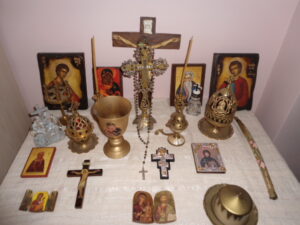
Now, I’m not suggesting that you think about all the above information every time you say these prayers. You’ll never get to praying them! But try to keep their depth and meaning in the back of your mind. I hope this article will help us all (me, especially) to pray better and more attentively.
God bless you all and keep you well.
Next Week: The Three Hierarchs: the Feast of Learning – knowledge, facts, truth, reason. This should be relevant.
Week after next: Unless something else comes up, we’ll begin a series on something Orthodox rarely write about – The Ten Commandments.